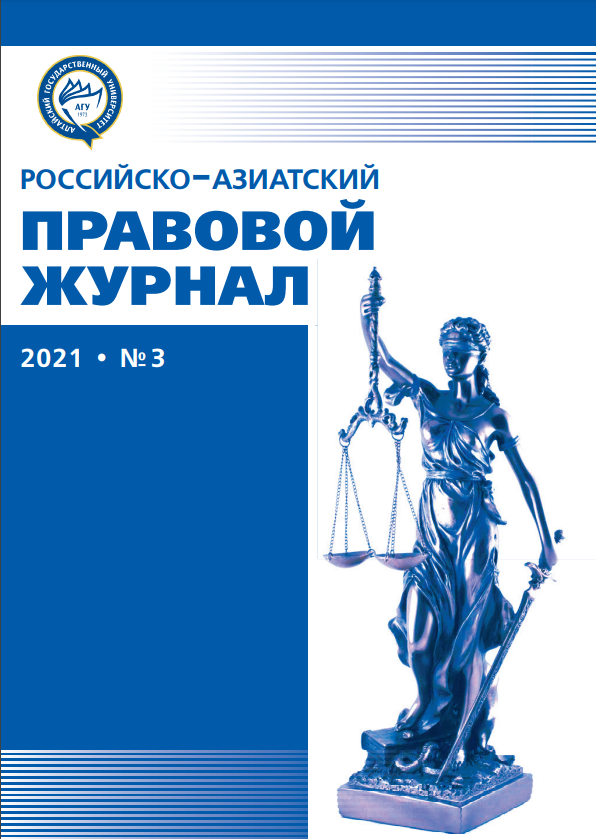ON SOME ASPECTS OF THE METHODOLOGY OF COMBATING THE IDEOLOGY OF TERRORISM AND CYBERTERRORISM IN THE AMONG RUSSIAN UNIVERSITIES (ON THE EXAMPLE OF THE ALTAI STATE UNIVERSITY)
УДК 343.341 ББК 67.408.131.11
Abstract
After the pandemic of the new coronavirus infection, marked by the «lockdowns’ of 2020, the crimesituation both in Russia and in the world has reached a qualitatively new level. We can say that the thresholdof population tolerance predicted at the 12th UN Congress on Crime Prevention and Criminal Justice byV.V. Luneev. Once again, the dialectical law on the transition of quantitative changes to qualitative ones wasconfirmed. It should be noted that this process continues to increase its pace in 2021: all large branches ofcrime are going into cyberspace. On this basis, the strengthening of the interaction of civil society institutionsand law enforcement agencies, especially among the youth, is becoming increasingly important. It is youngpeople who are a potential «risk group» in terrorist and cyber-terrorist crime, primarily as an object ofrecruitment. But it is young people who are the most active users of information and telecommunicationnetworks, including the Internet. In this regard, it seems that the priority lies precisely in the environment ofcivil society institutions that directly work with young people. And one of the main institutions is secondaryand higher education, and it is the network of universities that can become the flagship of the formation ofanti-terrorist ideology and skills in countering cyber terrorism.
Downloads
References
Абазов К.М. Проблема использования современных информационно-коммуникационных технологий международными террористическими организациями // Вопросы безопасности. 2018. №3.С. 1–9.
Овчинский В.С. Кибермафия становится глобальным игроком. URL: https://zavtra.ru/blogs/kibermafiya_stanovitsya_global_nim_igrokom.
Бутусова Л.И. К вопросу о киберпреступности в международном праве // Вестник экономической безопасности. 2016. №2. С. 48–52.
Чернядьева Н.А. Понятие «международный терроризм» в международных соглашениях ООН //Вестник СГЮА. 2012. №4 (87). С. 1181–1187.
Greene А. Terrorism definition: one size fits all? // International and comparative law. 2017. №66 (2). P. 411–440.
Рарог А.И. Уголовный кодекс России против терроризма // Lex Russica. 2017. №4 (125). С. 155–178.
Абдулатипов А.М. Понятие информационного терроризма // Юридический вестник Дагестанского гос. ун-та. 2019. №2. С. 105–111.
Авдеев В.А., Авдеева О.А. Преступность террористического характера и экстремистской направленности в РФ: состояние и тенденции правового регулирования // Российский судья. 2018. №8.С. 18–23.
Обрывко Е.И., Стародубцева М.А., Саенко А.А. О некоторых аспектах повышения правовой культуры в вопросах профилактики экстремизма и идеологии терроризма в образовательной среде // Гуманитарные, социально-экономические и общественные науки. 2020. №11. С. 81–84.
Мазуров В.А. Кибертерроризм: понятие, проблемы противодействия // Доклады ТУСУР. 2010. №1–1 (21). С. 41–45.
Цирлов В.Л. Правовые основы кибербезопасности Российской Федерации // Правовая информатика. 2013. №4. С. 66–68.
Russian-Asian Law Journal is a golden publisher, as we allow self-archiving, but most importantly we are fully transparent about your rights.
Authors may present and discuss their findings ahead of publication: at scientific conferences, on preprint servers, in public databases, and in blogs, wikis, tweets, and other informal communication channels.
Russian-Asian Law Journal allows authors to deposit manuscripts (currently under review or those for intended submission) in non-commercial, pre-print servers such as ArXiv.
Authors who publish with this journal agree to the following terms:
- Authors retain copyright and grant the journal right of first publication with the work simultaneously licensed under a Creative Commons Attribution License that allows others to share the work with an acknowledgement of the work's authorship and initial publication in this journal.
- Authors are able to enter into separate, additional contractual arrangements for the non-exclusive distribution of the journal's published version of the work (e.g., post it to an institutional repository or publish it in a book), with an acknowledgement of its initial publication in this journal.
- Authors are permitted and encouraged to post their work online (e.g., in institutional repositories or on their website) prior to and during the submission process, as it can lead to productive exchanges, as well as earlier and greater citation of published work (See The Effect of Open Access).








